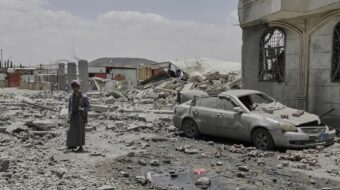During her visit to Israel this week, Secretary of State Hillary Clinton reaffirmed U.S. ties with Israel but said the Obama administration believes that working for a two-state solution is both inevitable and in Israel’s best interests.
“The inevitability of working toward a two state-solution is inescapable,” she told a news conference with Israeli Foreign Minister Tzipi Livni in Jerusalem today. ‘That doesn’t mean that we don’t respect the opinions of others who see it differently. But from my perspective and from the perspective of the Obama administration time is of the essence.’
‘The United States will be vigorously engaged in the pursuit of a two-state solution every step of the way,’ she declared.
Clinton also met with right-wing Prime Minister-designate Benjamin Netanyahu, who opposes two-state efforts and supports expansion of Jewish settlements in the Palestinian West Bank.
An Associated Press reported indications that Netanyahu could be backing off previous pledges to abandon peace talks with the Palestinians.
‘I think that Hillary Clinton … will find Benjamin Netanyahu prepared to continue to hold negotiations, not only on economic projects but also political negotiations, a political process,’ Silvan Shalom, a lawmaker from Netanyahu’s Likud Party, said ahead of the meeting between the two.
Netanyahu sounded a vaguely conciliatory tone when he spoke to journalists after his meeting with Clinton.
‘The common goal is creative thinking to get out of the maze and try to create a new reality,’ he said. ‘There is a deep will on both our sides to work in cooperation.’
On Wednesday, Clinton was scheduled to go to the West Bank for meetings with Palestinian President Mahmoud Abbas and other Palestinian officials.
In a significant break with Bush administration policy, Clinton announced the White House and State Department will send two senior officials to Syria to begin discussions.
Noting Syria’s importance in the Middle East, she called the reopening of talks ‘a worthwhile effort.’
This initiative comes after recent visits by U.S. senators, including John Kerry, chairman of the Senate Foreign Relations Committee.
The Bush administration recalled its ambassador from Damascus in February 2005.
Clinton traveled to Israel after attending an international donors’ conference in Sharm el Sheik, Egypt, focused on humanitarian and reconstruction aid for Gaza, whose population is still reeling from the three-week Israeli air and ground assault that ended in January.
Clinton told Arab and European leaders at that conference that the U.S. was ‘committed to a comprehensive peace between Israel and its Arab neighbors’ and would ‘pursue it on many fronts.’
‘It is not enough just to respond to the immediate needs of the Palestinian people,’ she said. ‘Our response to today’s crisis in Gaza cannot be separated from our broader efforts to achieve a comprehensive peace. Only by acting now can we turn this crisis into an opportunity that moves us closer to our shared goals.’
‘We are reaching out to determine what, if any, areas of cooperation and engagement are productive, and that includes Syria,’ Clinton told a news conference, as reported in The New York Times.
At the conference, she pledged more than $900 million in U.S. aid to the Palestinian people, with $300 million of that earmarked for relief for Gaza. The donors’ conference raised nearly $4.5 billion, according to the Egyptian government, but the problem will be in guaranteeing that the Palestinian people actually receive the aid.
A key immediate issue is Israel’s failure to open border crossings to Gaza to allow essential goods and reconstruction aid to go through.
United Nations Secretary-General Ban Ki-Moon, speaking to the delegates at the conference, called the situation at the border crossings “intolerable.”
“Aid workers do not have access. Essential commodities cannot get in,’ Ban said. ‘Our first and indispensable goal is to open crossings.’
Opening of the crossings is a major issue in indirect Israel-Hamas negotiations now being brokered by Egypt.
Talks are also under way among Palestinian parties aimed at forming a national unity government.
At the donors’ conference Clinton said the U.S. would only deal with a Palestinian unity government that renounced terrorism and recognized the right of Israel to exist. U.S. aid money, she said, would go only to the Palestinian Authority and would have restrictions to ensure it ‘does not end up in the wrong hands’ – another reference to Hamas.
A group of former international peace negotiators has called on the U.S. and Europe to drop its refusal to deal with Hamas.
‘As former peace negotiators, we believe it is of vital importance to abandon the failed policy of isolation and to involve Hamas in the political process,’ they said in a public letter published Feb. 26, in the UK Times.
Signers include former UN Middle East envoy Alvaro de Soto, former European Union envoy for Bosnia Paddy Ashdown, Australia’s ex-foreign minister and Cambodia peace negotiator Gareth Evans and former Israeli Foreign Minister Shlomo Ben-Ami.
‘Whether we like it or not, Hamas will not go away,’ they said. ‘Yes, Hamas must recognize Israel as part of a permanent solution, but it is a diplomatic process and not ostracization that will lead them there.
‘Ending their isolation will in turn help in reconciling the Palestinian national movement, a vital condition for meaningful negotiations with Israel,’ they insisted.
‘We must recognize that engaging Hamas does not amount to condoning terrorism or attacks on civilians. In fact, it is a precondition for security and for brokering a workable agreement.’










